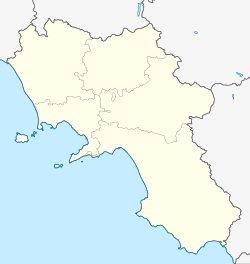Main sights
On the hill above the town are the ruins of the medieval castle dismantled by Roger II of Sicily in 1135 during his struggle against rebellious barons. [3] The new town ("Terra Murata", which means walled or fortified town) was built at the foot of the hill under the king's supervision and has remained intact to this day.
Although the large parish church of Sant'Andrea was founded during the Norman domination (1151) it contains almost nothing from that period. There is a fresco of the Last Judgement that covers the walls of a large chapel to the left of the entrance (1602). The church also contains several wooden sculptures from the 16th and 17th centuries, including a statue of Saint Andrew.
The Capuchin monastery situated on a nearby hill and immersed in its own citrus tree orchard was built in 1561, though the church was rebuilt in the 18th century. The single-nave church dedicated to the Madonna degli Angeli contains several important paintings: a Nativity by the early 16th century Calabrian painter Pietro Negroni and a Madonna Enthroned by Francesco Celebrano. Saint Leopoldo Mandic lived here for a year towards the end of World War I.
This page is based on this
Wikipedia article Text is available under the
CC BY-SA 4.0 license; additional terms may apply.
Images, videos and audio are available under their respective licenses.



